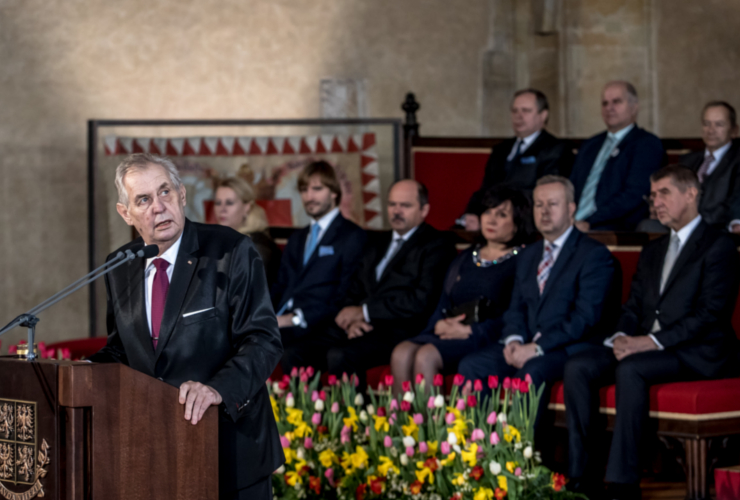The execution-style murders of journalist Ján Kuciak and his fiancée, Martina Kušnírová, shocked Slovakia, shook up the country’s politics and spurred the resignation of Prime Minister Robert Fico. While Kuciak’s work, including a posthumously published investigation into ties between Fico confidants and the Italian mafia, tapped into widespread animus over corruption, it is less clear how directly the incident has impacted public attitudes about journalism’s role in a free society.
Though extreme in its violence, Kuciak’s murder is part of a long pattern of hostility directed media in Slovakia, and Central Europe more generally. In both words and deeds, top state officials from Slovakia, the Czech Republic, Hungary and Poland have regularly sought to portray the press as an enemy. In a striking illustration of how sustained the effort to undermine the press’s watchdog role is, many continue to do so even after Kuciak’s murder.
Fico himself has a well-catalogued history of directing aggression at journalists, calling them “dirty, anti-Slovak prostitutes”, “slimy snakes” and “toilet spiders” at various times. In addition, the former premier sought to ignore media he perceived as unfriendly, Alena Kluknavská, a media scholar at the Centre for Nonprofit Sector Research at Masaryk University in Brno, Czech Republic, said.
Meanwhile, his government also sought to limit coverage of parliament, cutting accreditations, restricting reporters’ movement and requiring the press to have escorts when attending committee meetings.
“He (Fico) does not like critical questions or critical comments, and responded by failing to answer the questions of some journalists and delegitimizing their work”, Miroslova Kernová, editor of the OMédiách.com, a website tracking Slovak media, added. “No other politician did this.”
Fico’s approach is hardly unique in the region, nor is it the most extreme. Miloš Zeman, the Czech president, notoriously posed holding a mock rifle engraved with the phrase “For Journalists”. On a second occasion, Zeman joked with Russian President Vladimir Putin, saying that journalists should be “liquidated”. Even more recently, with controversy swirling over Kuciak’s untimely death, Zeman used his inauguration speech on March 8 to criticize specific media outlets, accusing them of “an attempt to manipulate the Czech public”. He condemned Economia – publisher of the leading business daily Hospodářské noviny and the liberal weekly Respekt, among other titles – for “lecturing us daily on how we should behave,” while deriding the work of Czech Television (ČT), the country’s public service broadcaster. Amid similar criticisms from Andrej Babiš, the billionaire who won the October 2017 general election and is now in the process of forming a government, this rhetoric has increased concerns about about future editorial independence at ČT.
“We absolutely reject any attacks on journalists and independence of the media, especially after the recent events in Slovakia, and in particular those by the highest official of the Czech Republic”, a ČT spokeswoman said in the wake of Zeman’s speech.
Just one week later, in Hungary, Prime Minister Victor Orbán campaigned before a crowd in Budapest, and sought to paint media as his one of his opponents. “We are up against media outlets maintained by foreign concerns and domestic oligarchs, professional hired activists, troublemaking protest organizers, and a chain of NGOs financed by an international speculator, summed up by and embodied in the name George Soros”, he said.
In sum, key power brokers throughout the region are engaged in near-continuous attack on the press, which, along with ownership concentration and a spike in fake news spread via social networks, fuels distrust and hostility toward the press.
Though Jaroslaw Kaczynski, the leader of Poland’s ruling Law and Justice party (PiS), has issued fewer verbal attacks on the media than regional counterparts, Poland is hardly immune. President Andrzej Duda has made common cause on the issue with U.S. President Donald Trump. On January 18, Duda tweeted: “President Trump @realDonaldTrump just stressed again the power of fake news. Thank you. We must continue to fight that phenomenon. Poland experiences fake news power first hand. Many European and even US officials form their opinions of PL based on relentless flow of fake news.”
Though it may have once been possible to write off such comments as short term, if irresponsible, political tactics, in the wake of Kuciak’s death there are also indications that the atmosphere resulting from such talk may – even if unintentionally – give license to rogue actors who take matters in their own hands.
“Citizens take their cues from political elites”, Kluknavská said.
[separator style_type=”none” top_margin=”15″ bottom_margin=”20″ sep_color=”#eae9e9″ border_size=”” icon=”” icon_circle=”no” icon_circle_color=”#ffffff” width=”” alignment=”center” class=”” id=””]
[content_boxes layout=”clean-horizontal” columns=”1″ icon_align=”left” title_size=”18″ backgroundcolor=”#98cbb8″ icon_circle=”” icon_circle_radius=”” iconcolor=”#98cbb8″ circlecolor=”#98cbb8″ circlebordercolor=”#98cbb8″ circlebordercolorsize=”” outercirclebordercolor=”#98cbb8″ outercirclebordercolorsize=”” icon_size=”” link_type=”” link_area=”” animation_delay=”” animation_offset=”” animation_type=”0″ animation_direction=”down” animation_speed=”0.1″ margin_top=”0″ margin_bottom=”0″ class=”” id=””]
[content_box title=”#V4PressFreedom” icon=”” backgroundcolor=”#98cbb8″ iconcolor=”#000000″ circlecolor=”#98cbb8″ circlebordercolor=”” circlebordercolorsize=”” outercirclebordercolor=”” outercirclebordercolorsize=”” iconrotate=”” iconspin=”no” image=”” image_width=”35″ image_height=”35″ link=”” linktarget=”_self” linktext=”” animation_type=”0″ animation_direction=”down” animation_speed=”0.1″]
This article is part of IPI’s #V4PressFreedom series, which tracks and analyses threats to press freedom and independent journalism in the V4 countries: Poland, Hungary, Slovakia and the Czech Republic.
[/content_box]
[/content_boxes]
[content_boxes settings_lvl=”child” layout=”clean-horizontal” columns=”1″ icon_align=”left” title_size=”18″ title_color=”” body_color=”” backgroundcolor=”#dcdadb” icon_circle=”” icon_circle_radius=”” iconcolor=”#dcdadb” circlecolor=”#dcdadb” circlebordercolor=”#dcdadb” circlebordersize=”” outercirclebordercolor=”” outercirclebordersize=”” icon_size=”” icon_hover_type=”” hover_accent_color=”” link_type=”” link_area=”” link_target=”” animation_delay=”” animation_offset=”” animation_type=”0″ animation_direction=”down” animation_speed=”0.1″ margin_top=”0″ margin_bottom=”0″ class=”” id=””][content_box title=”” icon=”” backgroundcolor=”#dcdadb” iconcolor=”#000000″ circlecolor=”#dcdadb” circlebordercolor=”” circlebordersize=”” outercirclebordercolor=”” outercirclebordersize=”” iconrotate=”” iconspin=”no” image=”” image_width=”35″ image_height=”35″ link=”” linktext=”” link_target=”_self” animation_type=”0″ animation_direction=”down” animation_speed=”0.1″]
Press freedom is under threat. But you can help.
To Our Readers: We need independent news and information more than ever, but journalists around the globe are increasingly under attack for doing their jobs. IPI works every day to support independent journalism and the free flow of news. But we need your help. By becoming an IPI member or supporter, you strengthen our mission to protect everyone’s right to be informed.
» Become an IPI member
» Support IPI’s work
» Subscribe to our weekly newsletter
[/content_box][/content_boxes]
